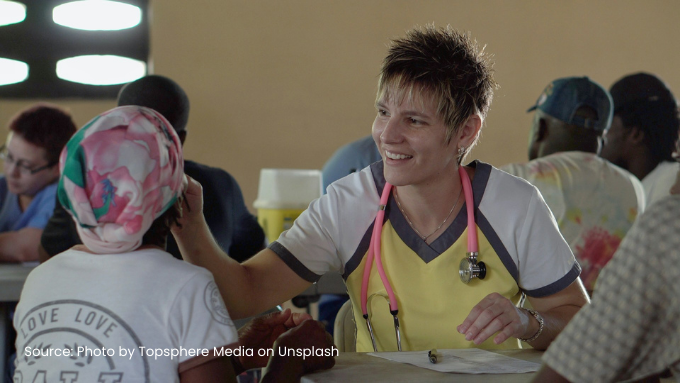Providing Diabetes Mellitus Nephropathy Diet in Hyperglycemia Patients with Diabetes Mellitus Type 2 Non-Obese with Anemia Suspect Acute Hepatitis: A Case Report

Downloads
Background: As many as 40% of people with diabetes mellitus type 2 have complications in the kidneys called diabetes mellitus nephropathy. Diabetes mellitus nephropathy is a degenerative disorder in the kidney vascular system that is associated with a disorder of sugar intolerance or carbohydrate metabolism. Anemia can occur in patients with kidney disorders and is exacerbated by acute hepatitis. The Standardized Nutrition Care Process (NCP) to provide proper nutrition to the patient is carried out by administering a 1300 kcal diabetes mellitus nephropathy diet.
Objectives: To know the implementation of the Nutrition Care Process by administering a 1300 kcal Diabetes Mellitus Nephropathy diet to patients.
Methods: A case study was conducted in March 2021 in patients at Bhayangkara Surabaya Hospital. Sampling has been determined in advance by the hospital nutritionist and internship guide according to the case criteria. The data collection method is carried out with observation and analysis over 3 days in the field of intake, physical/clinical, biochemical, and anthropometry. The researchers also conducted literature studies to supplement the data.
Results: Monitoring and evaluation results showed that there were fluctuating changes in laboratory, physical/clinical outcomes, and patient intake. At the patient’s energy intake increased from day to day but macronutrient fulfillment has not reached the target (<80%).
Conclusions: The patient's recovery condition was not sufficiently good, from the physical/clinical monitoring results still showed a decrease, and the results of the biochemical examination showed an increase in Hb levels in patients despite still being low, and for three days it was found that patient intake increased despite being insignificant and still not meeting the targeted daily needs.
Aprilia, M. and Wreksoatmodjo R, B. (2015) ‘Pemeriksaan Neurologis pada Kesadaran Menurun', Cermin Dunia Kedokteran, 42(10), pp. 780–786. Available at: https://media.neliti.com/media/publications/399680-pemeriksaan-neurologis-pada-kesadaran-me-1d4f9916.pdf.
Azis, W.A., Muriman, L.Y. and Burhan, S.R. (2020) ‘Hubungan Tingkat Pengetahuan dengan Gaya Hidup Penderita Diabetes Mellitus', Jurnal Penelitian Perawat Profesional, 2(1), pp. 105–114. Available at: https://doi.org/10.37287/jppp.v2i1.52.
Bellizzi, V. (2013) ‘Low-Protein Diet or Nutritional Therapy in Chronic Kidney Disease?', Blood Purification, 36(1), pp. 41–46. Available at: https://doi.org/10.1159/000350585.
Betteng, R. et al. (2014) ‘Analisis Faktor Resiko Penyebab Terjadinya Diabetes Melitus Tipe 2 pada Wanita Usia Produktif Dipuskesmas Wawonasa', Jurnal e-Biomedik (eBM), 2(2), pp. 404–412. Available at: https://media.neliti.com/media/publications/68709-ID-analisis-faktor-resiko-penyebab-terjadin.pdf.
ES Satria, H., Decroli, E. and Afriwardi (2018) ‘Faktor Risiko Pasien Nefropati Diabetik yang Dirawat Di Bagian Penyakit Dalam Rsup Dr. M. Djamil Padang', Jurnal Kesehatan Andalas, 7(2). Available at: http://jurnal.fk.unand.ac.id/index.php/jka/article/view/794/650.
Hajimohammadebrahim-Ketabforoush, M. et al. (2021) ‘Protein and Energy Intake Assessment and Their Association with In-Hospital Mortality in Critically Ill COVID-19 Patients: A Prospective Cohort Study', Frontiers in Nutrition, 8. Available at: https://doi.org/10.3389/fnut.2021.708271.
Imelda, S.I. (2019) ‘Faktor-Faktor yang Mempengaruhi Terjadinya Diabetes Melitus di Puskesmas Harapan Raya Tahun 2018', Scientia Journal, 8(1), pp. 28–39. Available at: https://doi.org/10.5281/scj.v8i1.406.
Kementrian Kesehatan Republik Indonesia (2022) Keputusan Direktur Jenderal Pelayanan Kesehatan Nomor Hk.02.02/I/1684/2022 Tentang Tata Laksana Hepatitis Akut pada Anak yang Belum Diketahui Penyebabnya Di Fasilitas Pelayanan Kesehatan. https://yankes.kemkes.go.id/unduhan/fileunduhan_1652767907_599270.pdf.
Kresnawan, T. and Darmarini, F. (2004) ‘Penatalaksanaan Diet pada Nefropati Diabetik', Journal of The Indonesian Nutrition Association, 27(2), pp. 77–81. Available at: https://doi.org/https://doi.org/10.36457/gizindo.v27i2.9.
Lestari, I.P., Lipoeto, N.I. and Almurdi, A. (2018) ‘Hubungan Konsumsi Zat Besi dengan Kejadian Anemia pada Murid SMP Negeri 27 Padang', Jurnal Kesehatan Andalas, 6(3), p. 507. Available at: https://doi.org/10.25077/jka.v6i3.730.
Melyana and Sarotama, A. (2019) ‘Implementasi Peringatan Abnormalitas Tanda-Tanda Vital pada Telemedicine Workstation', in Seminar Nasional Sains dan Teknologi ‘Aplikasi dan Teknologi Maju untuk Membangun Kemandirian Bangsa'. Jakarta: Fakultas Teknik Universitas Muhammadiyah Jakarta, pp. 1–9.
Nurjana, M.A. and Veridiana, N.N. (2019) ‘Hubungan Perilaku Konsumsi dan Aktivitas Fisik dengan Diabetes Mellitus di Indonesia', Buletin Penelitian Kesehatan, 47(2), pp. 97–106. Available at: https://doi.org/10.22435/bpk.v47i2.667.
PERKENI (2019) Pedoman Pengelolaan dan Pencegahan Diabetes Melituss Tipe 2 Dewasa di Indonesia.
Persatuan Ahli Gizi Indonesia Asosiasi Dietesien Indonesia (2019) Penuntun Diet dan Terapi Gizi. Edisi 4. Jakarta: EGC.
Putri, I.R. (2015) ‘Faktor Determinan Nefropati Diabetik pada Penderita Diabetes Mellitus Di Rsud Dr. M. Soewandhie Surabaya', Jurnal Berkala Epidemiologi, 3(1), pp. 109–121.
Rivandi, J. and Yonata, A. (2015) ‘Hubungan Diabetes Melitus Dengan Kejadian Gagal Ginjal Kronik', Medical Journal of Lampung University, 4(9), pp. 27–34. Available at: https://juke.kedokteran.unila.ac.id/index.php/majority/article/view/1404/1246.
Sarwana, S. (2016) Hubungan Penyakit Ginjal Kronik Dengan Anemia pada Pasien Rawat Inap Rsud Bari Palembang Tahun 2014. Universitas Muhammadiyah Palembang. Available at: http://repository.um-palembang.ac.id/id/eprint/1415/1/SKRIPSI1212-1712147981.pdf.
Setyaningsih, A., Puspita, D. and Rosyidi, M.I. (2013) ‘Perbedaan Kadar Ureum & Creatinin pada Klien yang Menjalani Hemodialisa dengan Hollow Fiber Baru dan Hollow Fiber Re Use Di RSUD Ungaran', Jurnal Keperawatan Medikal Bedah, 1(1), pp. 15–24. Available at: https://jurnal.unimus.ac.id/index.php/JKMB/article/view/937/989.
Siswanto (2020) Epidemiologi Penyakit Hepatitis. Edited by A. MH. Samarinda: Mulawarman University Press. Available at: https://repository.unmul.ac.id/bitstream/handle/123456789/6028/Buku%20Sis%20Hepatitis%20%28Edited%29.pdf?sequence=1&isAllowed=y.
Swan, W.I. et al. (2017) ‘Nutrition Care Process and Model Update: Toward Realizing People-Centered Care and Outcomes Management', Journal of the Academy of Nutrition and Dietetics, 117(12), pp. 2003–2014. Available at: https://doi.org/10.1016/j.jand.2017.07.015.
Yaswir, R. and Ferawati, I. (2012) ‘Fisiologi dan Gangguan Keseimbangan Natrium, Kalium dan Klorida serta Pemeriksaan Laboratorium', Jurnal Kesehatan Andalas, 1(2), pp. 80–85.
Copyright (c) 2024 Nida'ul Haq

This work is licensed under a Creative Commons Attribution-ShareAlike 4.0 International License.
Media Gizi Kesmas by Unair is licensed under a Creative Commons Attribution-ShareAlike 4.0 International License.
1. The journal allows the author(s) to hold the copyright and to retain the publishing right of the article without restrictions.
2. The legal formal aspect of journal publication accessibility refers to Creative Commons Attribution-Share-Alike (CC BY-SA).
3. The Creative Commons Attribution-Share-Alike (CC BY-SA) license allows re-distribution and re-use of a licensed work on the conditions that the creator is appropriately credited and that any derivative work is made available under "the same, similar or a compatible license”. Other than the conditions mentioned above, the editorial board is not responsible for copyright violations.



















